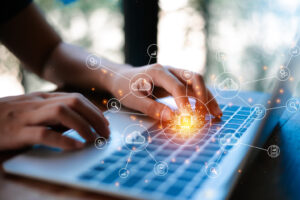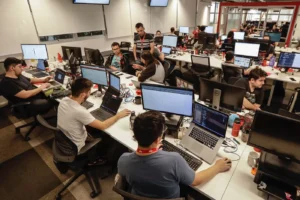Model brings together groups with a common purpose and gives all the power to the community
Ready for another essential term to understand the future in the digital universe? So here goes: the word of the moment is DAO, an acronym that, in English, describes “decentralized autonomous organizations” (or Decentralized Autonomous Organizations).
A DAO is a type of organization in which a group of people who have a common goal come together (without leadership) and use technology blockchain to make decisions together, such as investing in a company or crowdfunding to buy NFTs. To do this, the group also controls a portfolio of cryptocurrencies.
The difference for traditional organizations or for the crowdfunding is that at DAO everyone is the owner and manager of the group. To join a DAO, you must purchase tokens, which are issued in blockchain and provide access to the organization's content, voting rights and other benefits. All decisions are made through a voting system based on these tokens, so everyone has a voice in the process.
An example: in the virtual gallery PleasrDAO, a group of digital artists, NFT collectors and cryptocurrency investors came together to buy artwork worth millions of dollars. After acquiring these works as NFTs, all members of the group own them and decide how to manage this collection. The community votes, for example, whether they prefer to sell the works or display them somewhere (besides their website).
DAOs could also be used in the third sector, to create a social institution that accepts associations and donations from people around the world and decides, as a group, how they want to spend the donations. Or to start a venture investment fund where members pool their capital and then vote on which ventures they want to invest in, points to Ethereum.
What is the advantage of DAO?
Transparency in decision-making is a factor praised by DAO supporters, as the group's decisions are made using tokens, and your votes are public and permanently recorded in the blockchain.
DAOs are also considered more democratic than a traditional company, because everyone can vote on the group's decisions — not just executives and those on the board.
The rules are also clear: the backbone of a DAO is its smart contract, which replaces the role of the central authority. This contract is software that contains the organization's rules and executes a transaction or event as long as it complies with those rules. Payments, for example, are automatically authorized when they are approved in a vote, following the software code.
According to The New York Times, this is still a new experiment, with a radically different ownership model to accompany the next phase of the internet, the Web 3.0. Therefore, DAOs may still face challenges, such as governance problems and future regulations, in the United States, that consider the tokens as if they were securities (and thus it would be necessary to go through the same bureaucratic and costly process of registering a company that sells shares or securities).


